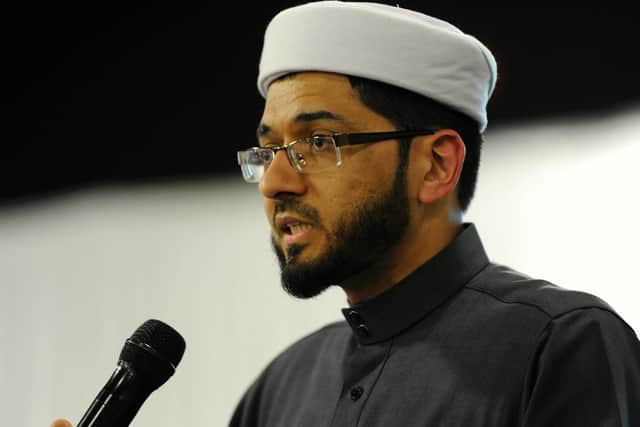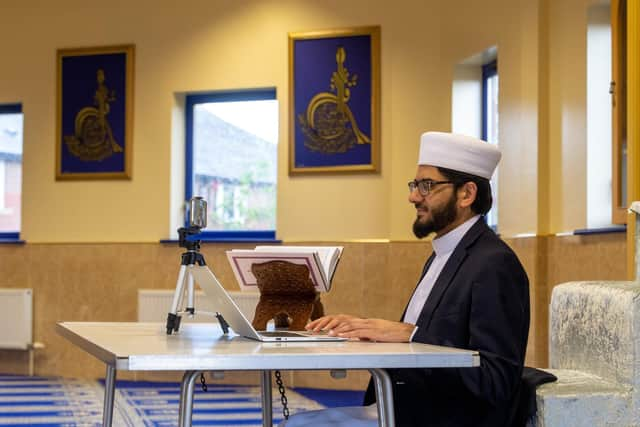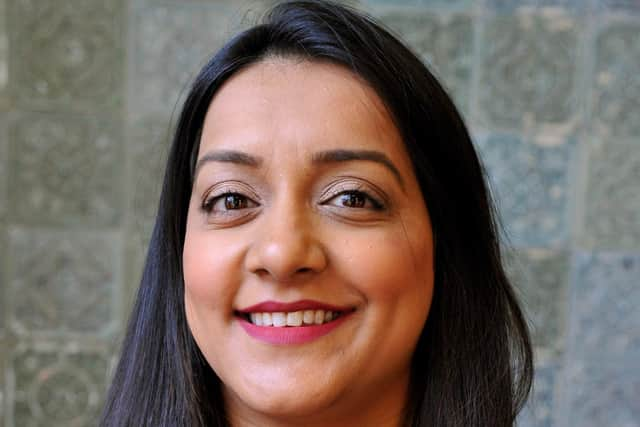Anti-Muslim online abuse 'leaving scars' on Leeds victims as Imam Qari Asim calls for city-wide action
and live on Freeview channel 276
Qari Asim MBE, imam at Makkah Mosque and a government adviser on Islamophobia, says hate speech "has left scars" on victims in Leeds.
His congregation members have been called "Bin Ladens", "ISIS supporters" and yelled at in the street, while women have had scarves snatched in appalling attacks.
Advertisement
Hide AdAdvertisement
Hide AdLeeds City Council research shows that Muslim people are most likely to be targeted by religiously-motivated hate crime than any other community in the city.


And online abuse can have an equally devastating impact on Muslims in Leeds, Imam Asim said, creating a sense of fear and dividing communities.
It comes as Yorkshire Evening Post's Call it Out campaign shares real-life experiences of abusive online behaviour, calling on the city to unite in the fight against abuse.
Advertisement
Hide AdAdvertisement
Hide AdImam Asim told the YEP: “I have personally experienced online abuse on a regular basis.


"Many of my congregation members have experienced anti-Muslim hatred: being called "Bin Ladens", "ISIS supporters", told to "go back home".
"Such anti-Muslim abuse has left scars on people and created a sense of fear not only for the victims but also families and friends.
"During lockdown, unfortunately we saw historical footage of when mosques were still open circulating on social media, being used to claim that Muslims are violating lockdowns and that cases of coronavirus would increase during Ramadan.
Advertisement
Hide AdAdvertisement
Hide Ad"In the most extreme instances, these claims come with abuse calling for the destruction of mosques.


"It is so disheartening to see Islamophobia is still prevailing especially during the most unprecedented times we are all living in."
Home Office statistics show there was an eight per cent increase in hate crime across the UK over the last year and 56 per cent of those crimes were religiously aggravated.
Leeds City Council, in partnership with the Shantona Women’s and Family Centre, have launched a Say No to Islamophobia campaign, working with the police, the NHS and other partners to take a pledge to beat Islamophobia.
Advertisement
Hide AdAdvertisement
Hide AdImam Asim is encouraged by work in the city and spoke during an online panel discussion led by St George's Church last month, with Rabbi Jason Kleiman and Lay Minister David Kibble.
The livestream was joined by hundreds of people and is one of many projects led by different faiths, opening discussions around how to tackle anti-Muslim hatred and antisemitism in Leeds.
Imam Asim said: "Such social action projects help dispel misconceptions about Muslims and help people in a neighbourhood build rapport with each other.
Advertisement
Hide AdAdvertisement
Hide Ad"Islamophobia is not concentrated just in Leeds but I do feel that because the city is so multicultural, it is more likely to experience intolerance.
"As we draw an end to Islamophobia Awareness Month, I endeavour us all to think about how we treat others and how we may prejudice, even if we don’t mean to.
"This means challenging information, speaking to your neighbours, ensuring that differences are celebrated and learning about the impact of intolerance and hatred on not only on the victims but society as a whole.
“It is the strength and will of the British people that we must use to our advantage, to promote cohesion and respect each other’s differences."
Advertisement
Hide AdAdvertisement
Hide AdThe council ran a series of online seminars for Islamophobia Awareness Month in November and is set to publish a report on how to challenge Islamophobia in Leeds.
Gipton and Harehills councillor Salma Arif said opening up conversations is key to challenging misconceptions about people of faith, as she calls for continued work extending beyond Islamophobia Awareness Month.
Cllr Arif said: "Statistics show anti-Muslim crimes are the highest in the city for any faith group.
“These attacks tend to increase after terrorist atrocities which are carried out by a Muslim, even if it’s elsewhere in the world - that’s when there tends to be more of a backlash.
Advertisement
Hide AdAdvertisement
Hide Ad"It’s misconceptions around other people who we maybe don't know too well and it's something we need to consistently work on in this area, saying no to Islamophobia.
"We need to learn from each other by opening doors to faith establishments.
"Visit My Mosque Day is a great initiative where people of other faiths, and of no faith, are welcomed into the Mosque to ask questions such as: what are Friday prayers? Why does a woman wear a hijab?
"Where we see discrimination of any form, whether it’s Islamophobia, antisemitism or whatever we see, we need to stand up to that."
Advertisement
Hide AdAdvertisement
Hide AdImam Asim added: "Interfaith and inter-community cohesion is absolutely imperative to a peaceful society.
"It is our responsibility as neighbours, faith leaders, activists, politicians, journalists, and communities to ensure we celebrate and promote that which binds us together, but equally challenge and debate the issues that may lead to division."
• The Call It Out campaign by the Yorkshire Evening Post was launched in July. It is sharing real-life experiences of people from all walks of life who have encountered abusive online behaviour and asking our readers to help play their part in reporting it to account admins, social media platforms and, where needed, the police. The campaign was also highlighted by MP Holly Lynch in Parliament earlier this month.
Support the YEP and become a subscriber today. Enjoy unlimited access to local news and the latest on Leeds United, With a digital subscription, you see fewer ads, enjoy faster load times, and get access to exclusive newsletters and content. Click here to subscribe.